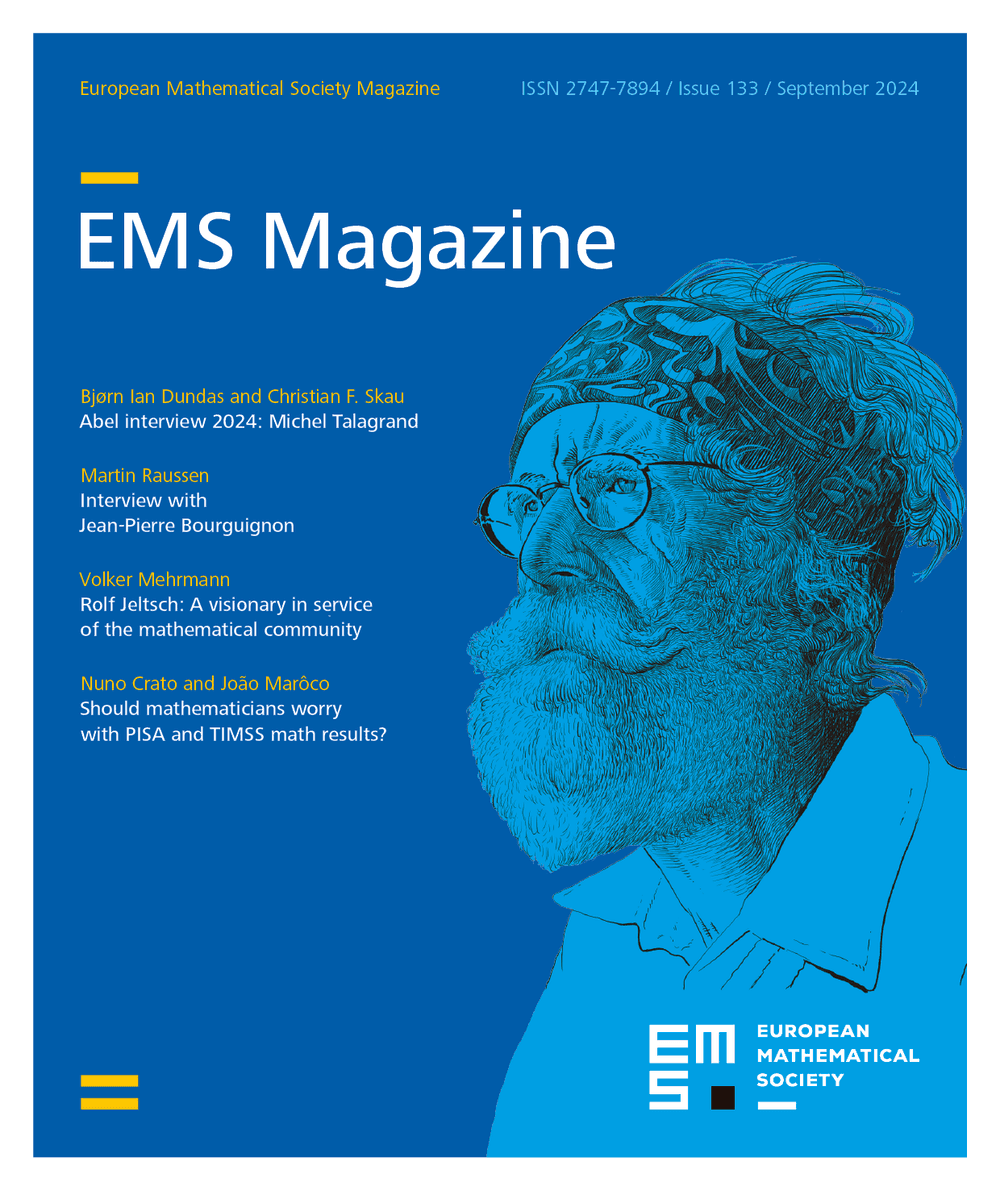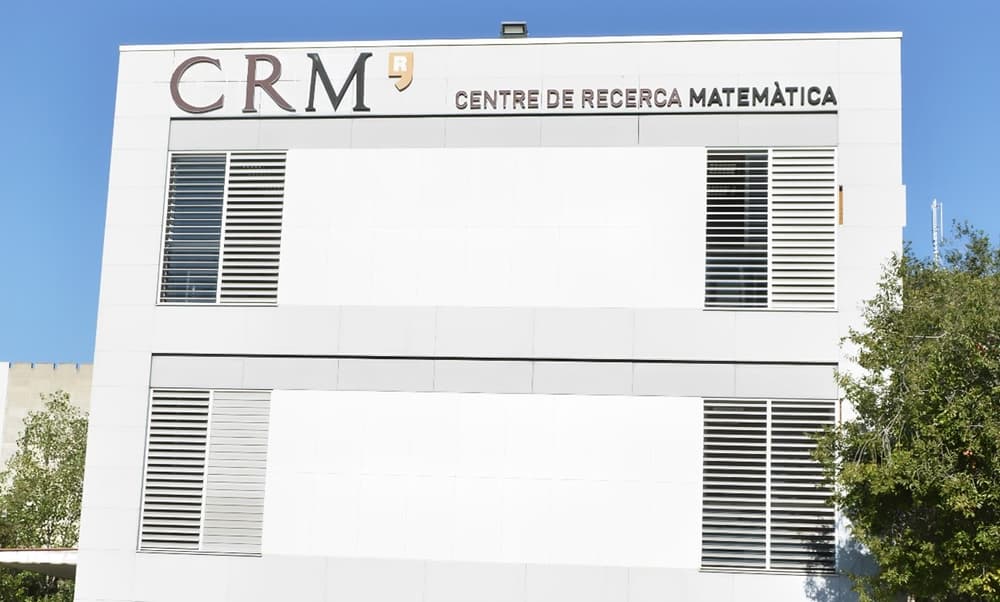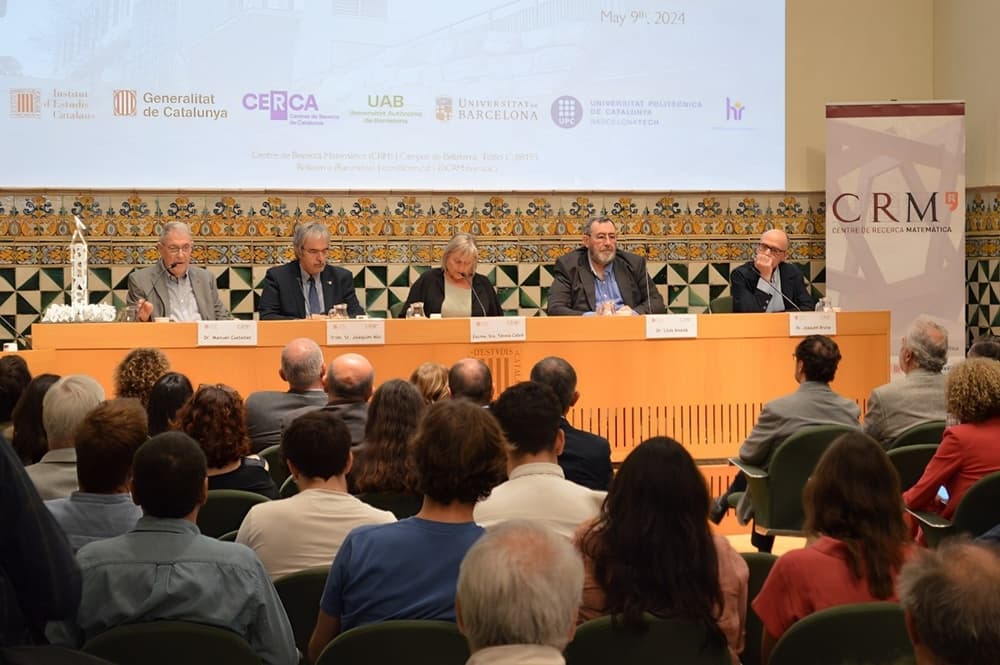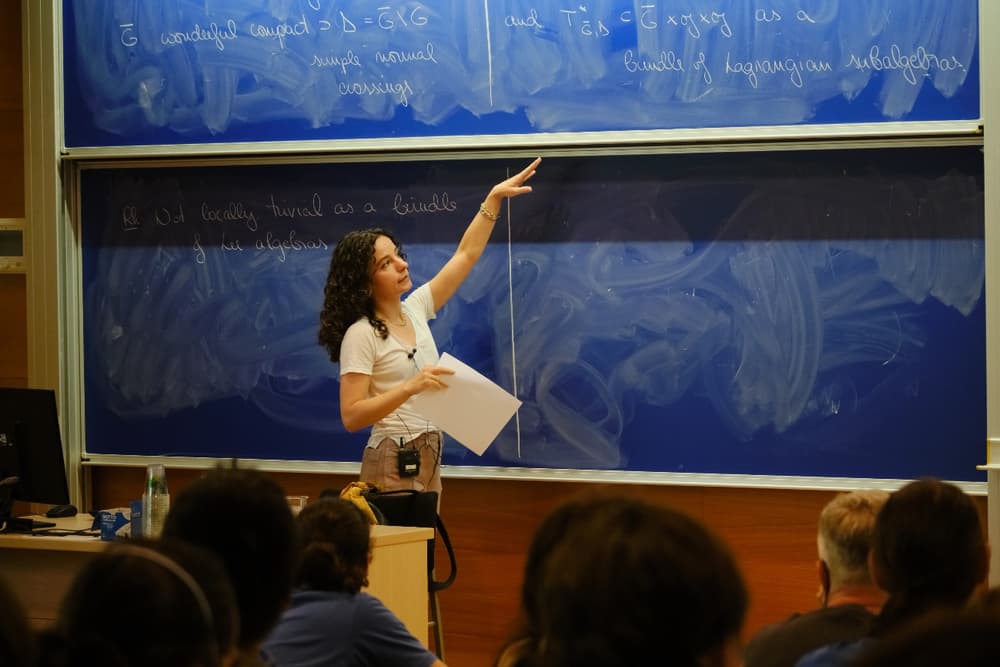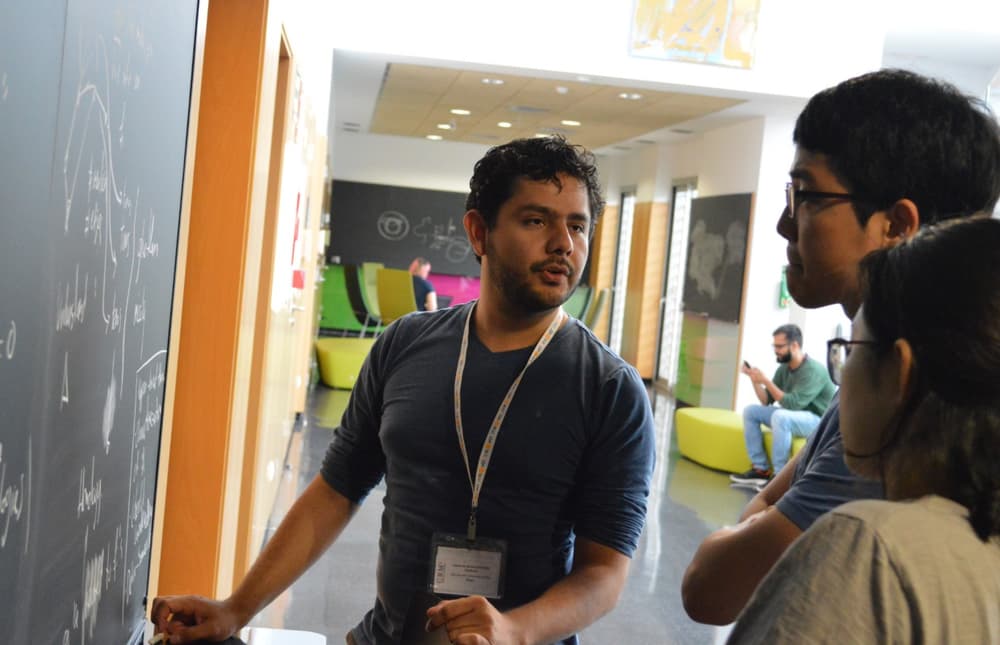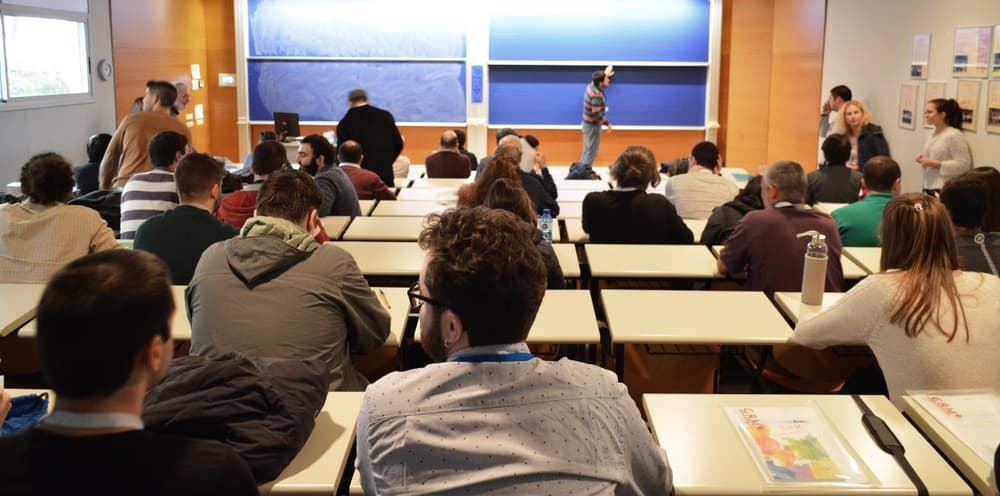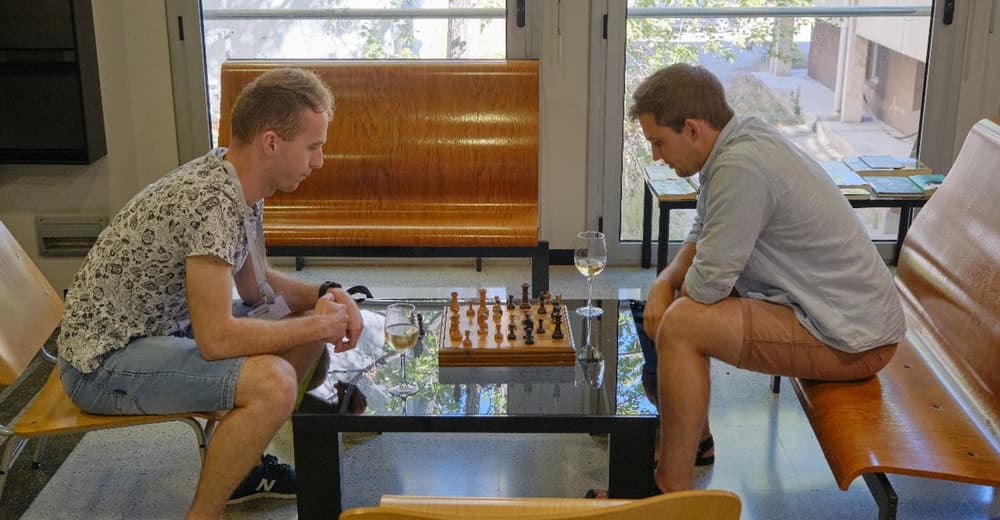Founded in 1984, the Centre de Recerca Matemàtica (CRM) has significantly advanced mathematical research in Catalonia, receiving prestigious awards and international recognition.
Created by the Institut d’Estudis Catalans, the CRM promotes international collaboration and advanced training, hosting events and supporting research in both fundamental and applied mathematics to address societal challenges.
Frontal view of the CRM building, located in the UAB Campus in Bellaterra.
©Centre de Recerca Matemàtica
On 9 May, the Centre de Recerca Matemàtica (CRM) celebrated its 40th anniversary with a special event at the Institut d’Estudis Catalans (IEC). The celebration featured a lecture by Madhu Sudan, a renowned mathematician and computer scientist from Harvard University, and included speeches by the Secretary General of Research and Universities of the Generalitat de Catalunya, the president of the IEC, and the three directors who have led the centre since its inception. This occasion provided an opportunity to reflect on the history and evolution of the CRM, highlighting the significant milestones and changes the centre has experienced over the past four decades.
Since the CRM opened its doors in 1984, at the initiative of Manuel Castellet, a professor at the Universitat Autònoma de Barcelona (UAB), the centre’s goal has been to increase research capacity and the level of mathematical research in Catalonia, promote its dissemination, and act as a catalyst for collaboration with renowned international mathematicians. Today, the CRM operates as a consortium between the Generalitat de Catalunya, the IEC, and the UAB. It is the oldest centre in the CERCA network of research institutes supported by the Catalan government and is a member of the European Research Centres on Mathematics (ERCOM).
Celebration of the CRM 40th anniversary at IEC. From left to right: Prof. Manuel Castellet (founder and first director of the CRM), Mr. Joaquim Nin, Secretary General of Research and Universities of the Government of Catalonia, Ms. Teresa Cabré, president of the Institute of Catalan Studies, Prof. Lluís Alsedà, director of the CRM, and Prof. Joaquim Bruna, former director of the CRM.
©Centre de Recerca Matemàtica
In these four decades of existence, the CRM has received several recognitions, such as the Narcís Monturiol Award for Scientific and Technological Merit and the María de Maeztu Unit of Excellence award, a distinction that recognizes national research institutions with highly competitive strategic programs, which the CRM has received twice.
A hub for the mathematical community
In Catalonia, prior to the establishment of the CRM, mathematical research was primarily conducted within academic settings and led by university professors. By the late 1970s and early 1980s, notable advancements were made in the research conditions within university mathematics departments. During this period, there was a surge in researchers’ aspirations to publish in international journals, an increase in visits from prominent figures, and a rise in the production of high-quality doctoral theses.
Recognizing this significant growth in mathematical research, the need for a dedicated research institute became evident. This led to the establishment of the CRM, marking a significant milestone as the first research institution in Spain devoted exclusively to mathematics. Over the past four decades, the CRM has been instrumental in strengthening and expanding mathematical research in the region. Its creation facilitated the collaboration among various Catalan university departments, fostering a dynamic environment for innovation and discovery.
The CRM organizes a diverse array of scientific events each year, including advanced courses, conferences, workshops, and seminars. These events feature invited speakers from around the globe, ensuring a rich exchange of knowledge and expertise.
©Centre de Recerca Matemàtica
Since its early days, the Centre de Recerca Matemàtica (CRM) has dedicated its facilities to encourage cooperation within the mathematical community. Mathematics is uniquely reliant on the human factor, with progress often driven by interaction and collaboration among researchers worldwide. To support this, the CRM has designed its spaces to promote the exchange of knowledge and ideas. The centre’s infrastructure encourages a positive space for productive discussions, enabling researchers from around the globe to effectively share insights and advance mathematical research together.
Situated in the Faculty of Sciences and Biosciences at the Universitat Autònoma de Barcelona (UAB), the CRM is well equipped to host premier events such as conferences, seminars, and congresses. Each year, the centre welcomes over a hundred mathematicians and researchers from other disciplines from across the world, who come as invited speakers, participants in scientific activities, or through funding programs like the Lluís Santaló Scholarship and the Research in Pairs program, which support long-term stays.
Training the next generation of mathematicians
In addition to serving as a hub for international collaboration, the CRM is deeply committed to nurturing young researchers and promoting diverse perspectives in mathematical research. The first PhD fellowships at the CRM were granted in 1988, highlighting the centre’s dedication to providing equal opportunities for advanced training in mathematics and bringing up the next generation of mathematical talent.
The CRM took a significant step towards its current stature as a leading research institution in 2008 by developing its own research structure. This structure now comprises eight groups that cover a wide spectrum of mathematical disciplines, from fundamental mathematics to various applied fields. By bridging the gap between pure and applied mathematics and addressing real-world phenomena through advanced mathematical frameworks, the CRM not only advances mathematical theory but also tackles practical challenges across numerous scientific and societal domains. This integrative approach ensures that the CRM remains at the forefront of both theoretical and applied mathematical research.
The CRM spaces are thoughtfully designed to foster discussion and exchanges among both senior researchers and invited speakers, as well as younger researchers.
©Centre de Recerca Matemàtica
In recent years, the CRM’s research structure has been further strengthened with an influx of new talent, consolidating and integrating its research groups, which now include researchers from the Universitat Autònoma de Barcelona (UAB), the Universitat de Barcelona (UB), and the Universitat Politècnica de Catalunya (UPC), alongside the CRM’s own research staff. Both UB and UPC are also in the process of joining the CRM’s board of trustees.
Currently, the CRM has 126 affiliated researchers, including established scholars, postdoctoral researchers, and doctoral students, all contributing to a vibrant and diverse research community. This collective expertise creates a rich and collaborative atmosphere, encouraging the exploration of mathematical research from all diverse perspectives.
The CRM auditorium is one of four available rooms for hosting events. Each room is fully equipped to facilitate online or hybrid format meetings, ensuring flexibility and accessibility for all participants.
©Centre de Recerca Matemàtica
Much accomplished, much to do
As the Centre de Recerca Matemàtica (CRM) celebrates its 40th anniversary, it reaffirms its mission to hold a standard of excellence in mathematical research and training on an international scale. Over the past four decades, the CRM has focused on conducting high-quality research, with an emphasis on real-world applications in collaborative and interdisciplinary contexts. This mission includes the transfer of knowledge derived from mathematical research, paying special attention to the implementation of models that address emerging social issues.
This milestone is a chance to reflect on our journey so far, while we prepare to tackle the challenges that lie ahead. Through sustained excellence in research and the promotion of collaboration, the CRM aims to shape the future of mathematics worldwide.
Research at CRM is conducted in an open environment that actively encourages collaboration among various research groups.
©Centre de Recerca Matemàtica
How can I participate?
There are several ways to engage with the Centre de Recerca Matemàtica (CRM). One option is to organize a congress or scientific event at the CRM by applying through the scientific programs and events application process.1https://www.crm.cat/scientific-programmes-events This allows researchers to utilize CRM’s facilities and support and collaborate with international experts.
Additionally, the CRM offers funding opportunities for researchers to conduct research stays and collaborate with local mathematicians. These funding programs enable extended stays at the CRM, fostering deep collaboration and innovative research. You can find more detailed information on the CRM’s portal for visitors.2https://www.crm.cat/calls-for-visitors
To stay updated on the latest news, opportunities and activities at CRM, consider signing up for our mailing list.3https://mailchi.mp/e0cf527a6773/crm-events
Cite this article
Pau Varela, Celebrating four decades of the Centre de Recerca Matemàtica. Eur. Math. Soc. Mag. 133 (2024), pp. 48–50
DOI 10.4171/MAG/211